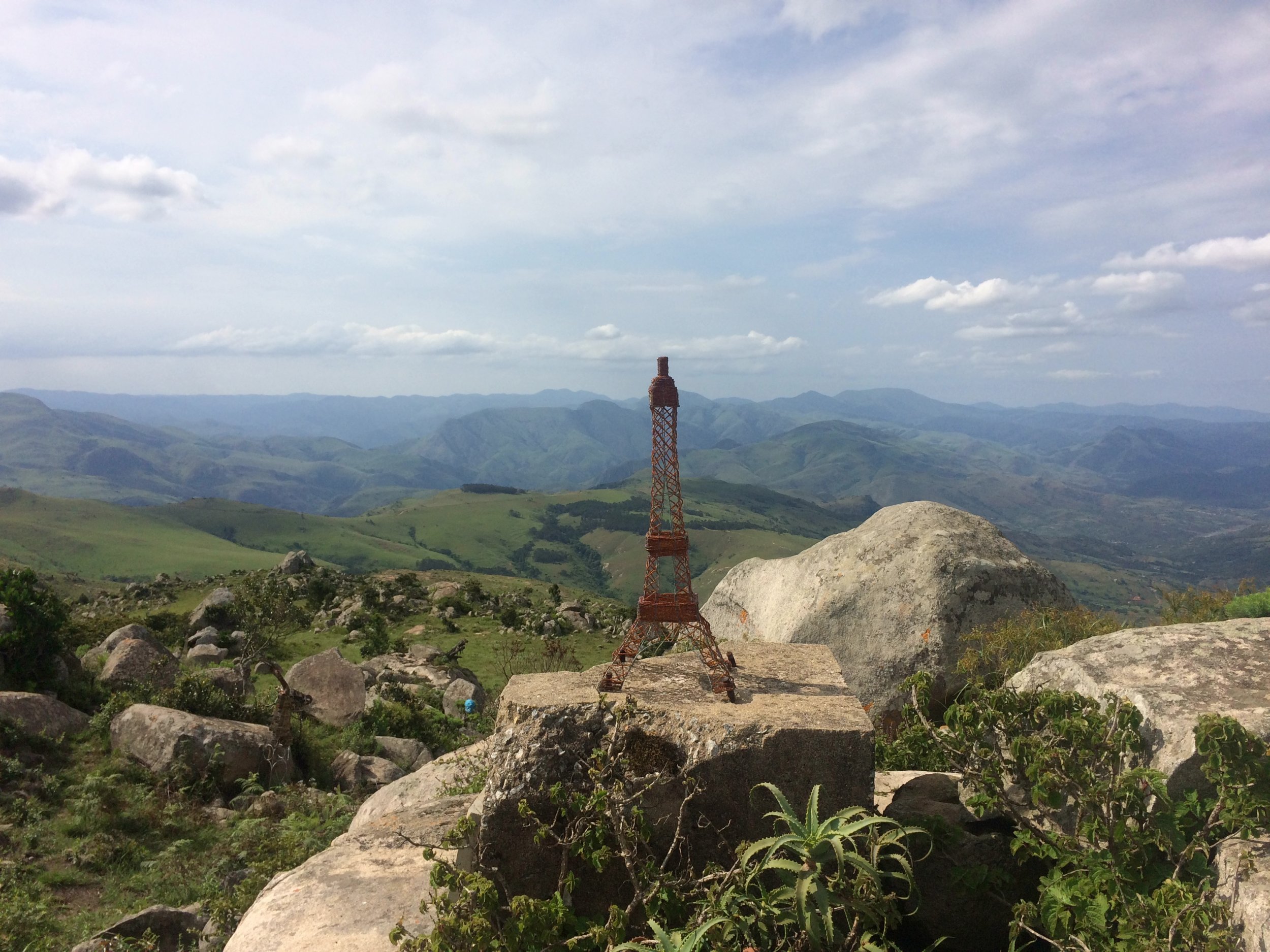
Shortly after dawn, Christiaan Erasmus dons a cashmere poncho and steps into the clouds that envelop his mountain retreat. We are on one of the highest points of Swaziland's Malolotja mountain range, along the country's northwestern border with South Africa. The 51-year-old stands on a boulder and watches the mists recede. "Welcome to the Sultan's Spiritual Retreat!" he exclaims in a cheerful Afrikaans accent. "Let's get some coffee." I follow him down the mountainside to the scattered huts that make up this remote retreat in Nkhaba, about 20 miles north of the capital, Mbabane.
At 5,250 feet above sea level, there is a slight chill in the air even in the summer month of January, when the fertile lower veld produces mangos, lychees and mosquitoes. Here, the only indication of life beyond the mountaintop is the distant clang of cattle bells. Later, as the sun burns through the clouds, a panoramic view emerges—of forest, farmland and fields of "Swazi gold," the cannabis famed abroad as the tiny country's top (unofficial) export.
A successful designer of bespoke menswear in his hometown of Johannesburg, where he recently reopened a shop, Erasmus has long been a devotee of the Kingdom of Swaziland, the continent's last absolute monarchy. As we make our way down the mountainside, stopping briefly for my host to demonstrate the moisturizing properties of a native aloe vera plant, I hear how he went from dressing South Africa's national cricket team to living among the clouds in Swaziland—and attracting paying guests to his retreat. He first visited Swaziland in 1986, returning year after year to this mountain range until the locals decided in 2008 to present him with 74 acres of land in recognition of his charitable contributions to the community and in the hope that he would invest in the area and boost the local economy. That gift had to be authorized by King Mswati III, who has ruled Swaziland for nearly 30 years and whose photograph graces every village shop.
Landlocked between South Africa and Mozambique, the kingdom remains a mystery to much of the world. Home to just over a million people, Swaziland gained independence from British rule nearly 50 years ago. Many have heard of the controversies surrounding Mswati and his 15 wives.
Erasmus moved here only last year, after he met fellow Swazi enthusiast Jonas Parpart, a 26-year-old aristocrat from Walldorf, Germany. Parpart built much of the mountain retreat himself, with the help of local men who arrive every morning to finish the last of the 15 rondavels, the Afrikaans word for the thatched, circular huts of the region. Erasmus sleeps in a cabin on the highest point of his land, which he refers to as the Penthouse; next to it stands a round Turkish hammam (Turkish bath) crowned by a life-size model of a white goat.
Guests are offered a choice of tents, rondavels and cabin rooms, which cost between $135 and $230 a night, depending on the season and the number of guests sharing. An ardent monarchist, Erasmus named his retreat in honor of the sultans who ruled the Ottoman Empire for more than half a millennium from Istanbul, where he used to live and where his designs are still produced.
Visitors to Swaziland often fall under the spell of its laid-back, rural community character—Erasmus is already welcoming international guests seeking refuge from the pressures of a 24/7 digital world. His first guests, a group of Turkish businessmen, arrived in the fall of last year. Stressed-out visitors can enjoy candles in place of electric lights, drink water collected from mountain streams and watch friendly cattle wandering among the rondavels.
So far, the local villagers have not seemed too concerned by Erasmus's eccentric setup. "At the beginning, they came and stared at us for hours. Especially the children," Erasmus says. It's easy to see why: A pair of white newcomers would have attracted attention, even without their occasional visitors and the extensive modern art collection they have scattered over the mountainside. Miniature Eiffel Towers, disembodied skulls made of colored beads, and stone busts emerge unexpectedly from the local vegetation. Skeletons arranged in disconcertingly lifelike poses are the creations of Erasmus's friend Thierry Fontaine, who exhibits in the Pompidou Center in Paris.
Erasmus leaves many practical details concerning the building of the retreat to Parpart, but he has no shortage of plans for the mountain peak. He hopes to build a creative community of dancers, artists and writers. The local community may be keen to participate. For less than a dollar, one elderly woman offered me an intricate basket she had woven out of dried grass. Erasmus later informs me this lady is one of the extended royal family, the Dlamini clan, whose members live scattered across the country, often in less than royal surroundings.
The Sultan's Spiritual Retreat may be unconventional, but Erasmus's guests are already booking repeat visits, and he is in talks with the Berlin branch of the international 5Rhythms dance movement to organize a work retreat on the mountain in October. "It's happening. It was just a dream, and now I'm watching it grow," he says, beaming. "People need this peace." And with tired souls seeking ever more remote hideaways from the modern world, the Sultan knows he is onto something.
FACTBOX: Alev Scott stayed at the Sultan's Spiritual Retreat courtesy of the owner. Guests are collected in Mbabane. A minibus shuttle runs to the capital from Johannesburg's O.R. Tambo International Airport ($61 return with the SiyeSwatini TransMagnific company; http://www.GoSwaziland.co.sz).
Uncommon Knowledge
Newsweek is committed to challenging conventional wisdom and finding connections in the search for common ground.
Newsweek is committed to challenging conventional wisdom and finding connections in the search for common ground.
About the writer
Alev Scott is a Turkish-British writer based in Istanbul. She is the author of Turkish Awakening: A Personal Discovery of Modern ... Read more
To read how Newsweek uses AI as a newsroom tool, Click here.








